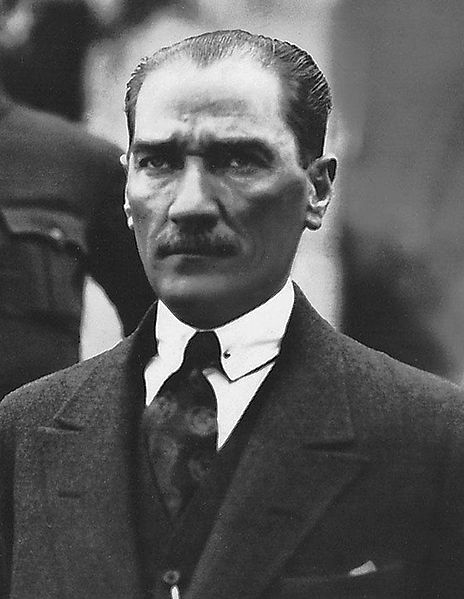19 May 1881–10 November 1938
Mustafa Kemal Atatürk, born Mustafa Pasha (1881-1938) was the founder of the Republic of Turkey and its first president, memorialized in Turkish culture as the father of the republic (Kissane, 2014). Born into a liberal middle-class Muslim family, Atatürk spent his early years receiving a secular schooling, later graduating top of his class from a military education founded in Western ideals and taught by Western-educated professors. This education, which stressed the importance of science and mathematics above religion, would prove to have an indelible effect upon the state Atatürk would later found (Hanioglu, 2017). After achieving minor fame for his exemplary leadership in the Gallipoli Campaign of World War One, Atatürk turned his post-war attentions to unifying resistance groups fighting against Greek imperialism and abuses of power by Entente forces (Alaranta, 2014). Though initially struggling to hold power over the Istanbul-based Sultanate, general opposition to the Sultan’s British alliance led to the legitimization of Atatürk’s Ankara-based parliament and the foundation of the Republic of Turkey on October 29, 1923 (Alaranta). During his tenure as president, Atatürk both westernized and secularized the Turkish Republic through the abolishment of the Caliphate, the closing of Sharia courts and opening of Western ones, the closing of religious schools, and the replacement of Arabic script with the Latin alphabet, among other things (Brown, 1996). He also effectually removed all political opposition and attempted to remove any association with minority identities by rallying the Turkish people behind a banner of monocultural Turkish nationalism (Kedourie, 1999).
Atatürk grew up in an Ottoman Empire which was beginning, however slowly, to embrace Western culture and ideals (Hanioglu). This empire, however, was experiencing social breakdown between the numerous ethnic factions coexisting – in order to quell dissent, statesmen attempted to introduce a kind of messianic nationalism rooted in the Ottoman Empire, though this later morphed into pan-Islamism, which exacerbated already existing religious tensions between Muslim and Christian factions (Hanigolu). The secularly educated Atatürk found this politicization of religion to be inappropriate but took note of the unifying properties of messianic nationalism, a concept which would later form the precepts of his eponymous doctrine of Kemalism (Hanioglu). French influence and thoroughly Western ideologies left over from the Ottoman reform era also made an impact upon Atatürk, who harmonized Enlightenment principles with an authoritarian regime to become a sort of enlightened despot (Alaranta).
Atatürk’s legacy lives on today through legislation and his status as something to emulate in Turkish politics (Brown). Though Islamist leaders have taken hold of power in Turkey since Atatürk’s death, his ideologies have become a quasi-system of checks and balances; especially in the military, which has thrice intervened to protect Atatürk’s state secularism (Brown). State secularism is also protected by complicated legislature which prevents the passing of laws favouring specific religious institutions, a foil of many would-be Islamist leaders (Brown). Atatürk’s persistent cult of personality has also deified him as the “ideal” leader, to whom subsequent Turkish political leaders and parties have all claimed to descend from and emulate in their policies (Brown). Atatürk’s controversial policies and removal of political opposition have permeated the current political scene, in which current President Recep Tayyip Erdogan has silenced critical journalists and often used brutal force to quell dissent and maintain political control (Timur, 2016).
Atatürk’s methods have also permeated world politics, most notably the precepts of the Nazi Party (Ihrig, 2014). After the end of WWI, a dilapidated Germany turned to Turkey as an example of which they would emulate to once again become a dominant European power (Ihrig).
Atatürk’s strong leadership, coupled with military might and rampant nationalism, became the ideal model of government to many far-right newspapers, and in turn, to many people who espoused these views (Ihrig). Nazi circles lauded Atatürk’s revolution as a sign that no matter how derelict a nation has become, a Volk uprising could always succeed (Ihrig). Hitler himself frequently spoke of Atatürk being a personal role model and idolized Atatürk’s movement, considering it a sign that the “analogous” Nazi movement in Germany would be successful as well (Ihrig). According to Ihrig (2014), Atatürk’s example “underlined where [the Nazis] were coming from. Yet, the ideological building blocks of this cult [of Atatürk] offered a variety of propagandistic and political tools that emphasized where they wanted to go” (146).
All in all, Atatürk’s reformations set a precedent for Westernization and created a secular state in a part of the world thoroughly entangled in Islamic traditions (Hanioglu). His impact on history is indelible, pervading not only the course of Turkish history, but also world history through his idolization by the Nazi Party and Adolf Hitler (Timur, 2016 and Ihrig, 2014). His governance further exemplifies the applications of messianic nationalism and its potent implications with regards to state nationalism, as well as the successes and difficulties of maintaining a secular state (Kedourie).
Nia Langdon
Works Cited
Asian Wall Street Journal, Sep 30, 1996. Hanioglu, S. (2017). Atatürk: An intellectual biography. Princeton: Princeton University Press.
Ihrig, S. (2014). Atatürk in the nazi imagination. Cambridge: Harvard University Press.
Kedourie, S. (1999). Turkey before and after atatürk: Internal and external affairs. Portland: Frank Cass Publishers.
The Review of Politics, 76
Timur, S. (2016, July 17). Turkey cracks down as coup unravels after a deadly night. The New York Times, p. 10N.
Webster, D. (1973). The turkey of atatürk. New York: AMS Press.
Other Relevant Reading
Insight Turkey, 15
Mango, A. (2000). Atatürk: the of the founder of modern turkey. Woodstock: Overlook Press. Qureshi, M.N. (2014). Ottoman turkey, ataturk, and muslim south asia. Toronto: Oxford University Press.
Alaranta, T. (2014). Contemporary kemalism: from universal secular-humanism to extreme
Turkish nationalism. New York: Routledge Press.
Brown, Brian A. “Ataturk’s Legacy and Turkey’s Army.”
Kissane, B. (2014). Atatürk and after: Three perspectives on political change in turkey.
(2), 293-307.
Heper, M. (2013). Islam, conservatism, and democracy in turkey: Comparing turgut özal and
recep tayyip erdogan.
(2), 141-156.
